- Home
- Henry David Thoreau
The Maine Woods (Writings of Henry D. Thoreau) Page 11
The Maine Woods (Writings of Henry D. Thoreau) Read online
Page 11
When afterward I asked an Indian at the carry how much taller the male was, he answered, "Eighteen inches," and made me observe the height of a cross-stake over the fire, more than four feet from the ground, to give me some idea of the depth of his chest. Another Indian, at Oldtown, told me that they were nine feet high to the top of the back, and that one which he tried weighed eight hundred pounds. The length of the spinal projections between the shoulders is very great. A white hunter, who was the best authority among hunters that I could have, told me that the male was not eighteen inches taller than the female; yet he agreed that he was sometimes nine feet high to the top of the back, and weighed a thousand pounds. Only the male has horns, and they rise two feet or more above the shoulders, -- spreading three or four, and sometimes six feet, -- which would make him in all, sometimes, eleven feet high! According to this calculation, the moose is as tall, though it may not be as large, as the great Irish elk, Megaceros Hibernicus, of a former period, of whichMantell says that it "very far exceeded in magnitude any living species, the skeleton" being "upward of ten feet high from the ground to the highest point of the antlers." Joe said, that, though the moose shed the whole horn annually, each new horn has an additional prong; but I have noticed that they sometimes have more prongs on one side than on the other. I was struck with the delicacy and tenderness of the hoofs, which divide very far up, and the one half could be pressed very much behind the other, thus probably making the animal surer-footed on the uneven ground and slippery moss-covered logs of the primitive forest. They were very unlike the stiff and battered feet of our horses and oxen. The bare, horny part of the fore-foot was just six inches long, and the two portions could be separated four inches at the extremities.
The moose is singularly grotesque and awkward to look at. Why should it stand so high at the shoulders? Why have so long a head? Why have no tail to speak of? for in my examination I overlooked it entirely. Naturalists say it is an inch and a half long. It reminded me at once of the camelopard, high before and low behind, -- and no wonder, for, like it, it is fitted to browse on trees. The upper lip projected two inches beyond the lower for this purpose. This was the kind of man that was at home there; for, as near as I can learn, that has never been the residence, but rather the hunting-ground of the Indian. The moose will perhaps one day become extinct; but how naturally then, when it exists only as a fossil relic, and unseen as that, may the poet or sculptor invent a fabulous animal with similar branching and leafy horns, -- a sort of fucus or lichen in bone, -- to be the inhabitant of such a forest as this!
Here, just at the head of the murmuring rapids, Joe now proceeded to skin the moose with a pocket-knife, while I looked on; and a tragical business it was, -- to see that still warm and palpitating body pierced with a knife, to see the warm milk stream from the rent udder, and the ghastly naked red carcass appearing from within its seemly robe, which was made to hide it. The ball had passed through the shoulder-blade diagonally and lodged under the skin on the opposite side, and was partially flattened. My companion keeps it to show to his grandchildren. He has the shanks of anothermoose which he has since shot, skinned and stuffed, ready to be made into boots by putting in a thick leather sole. Joe said, if a moose stood fronting you, you must not fire, but advance toward him, for he will turn slowly and give you a fair shot. In the bed of this narrow, wild, and rocky stream, between two lofty walls of spruce and firs, a mere cleft in the forest which the stream had made, this work went on. At length Joe had stripped off the hide and dragged it trailing to the shore, declaring that it weighed a hundred pounds, though probably fifty would have been nearer the truth. He cut off a large mass of the meat to carry along, and another, together with the tongue and nose, he put with the hide on the shore to lie there all night, or till we returned. I was surprised that he thought of leaving this meat thus exposed by the side of the carcass, as the simplest course, not fearing that any creature would touch it; but nothing did. This could hardly have happened on the bank of one of our rivers in the eastern part of Massachusetts; but I suspect that fewer small wild animals are prowling there than with us. Twice, however, in this excursion I had a glimpse of a species of large mouse.
This stream was so withdrawn, and the moose-tracks were so fresh, that my companions, still bent on hunting, concluded to go farther up it and camp, and then hunt up or down at night. Half a mile above this, at a place where I saw the aster puniceus and the beaked hazel, as we paddled along, Joe, hearing a slight rustling amid the alders, and seeing something black about two rods off, jumped up and whispered, "Bear!" but before the hunter had discharged his piece, he corrected himself to "Beaver!" -- "Hedgehog!" The bullet killed a large hedgehog more than two feet and eight inches long. The quills were rayed out and flattened on the hinder part of its back, even as if it had lain on that part, but were erect and long between this and the tail. Their points, closely examined, were seen to be finely bearded or barbed, and shaped like an awl, that is, a little concave, to give the barbs effect. After about a mile of still water, we prepared our camp on the right side, just at the foot of a considerable fall. Little chopping was done that night, for fear of scaring the moose. We had moose-meat fried for supper. It tasted like tender beef, with perhaps more flavor, -- sometimes like veal.
After supper, the moon having risen, we proceeded to hunt a mile up this stream, first "carrying" about the falls. We made a picturesque sight, wending single-file along the shore, climbing over rocks and logs, -- Joe, who brought up the rear, twirling his canoe in his hands as if it were a feather, in places where it was difficult to get along without a burden. We launched the canoe again from the ledge over which the stream fell, but after half a mile of still water, suitable for hunting, it became rapid again, and we were compelled to make our way along the shore, while Joe endeavored to get up in the birch alone, though it was still very difficult for him to pick his way amid the rocks in the night. We on the shore found the worst of walking, a perfect chaos of fallen and drifted trees, and of bushes projecting far over the water, and now and then we made our way across the mouth of a small tributary on a kind of net-work of alders. So we went tumbling on in the dark, being on the shady side, effectually scaring all the moose and bears that might be thereabouts. At length we came to a standstill, and Joe went forward to reconnoitre; but he reported that it was still a continuous rapid as far as he went, or half a mile, with no prospect of improvement, as if it were coming down from a mountain. So we turned about, hunting back to the camp through the still water. It was a splendid moonlight night, and I, getting sleepy as it grew late, -- for I had nothing to do, -- found it difficult to realize where I was. This stream was much more unfrequented than the main one, lumbering operations being no longer carried on in this quarter. It was only three or four rods wide, but the firs and spruce through which it trickled seemed yet taller by contrast. Being in this dreamy state, which the moonlight enhanced, I did not clearly discern the shore, but seemed, most of the time, to be floating through ornamental grounds, -- for I associated the fir-tops with such scenes; -- very high up some Broadway, and beneath or between their tops, I thought I saw an endless succession of porticos and columns, cornices and fa�ades, verandas and churches. I did not merely fancy this, but in my drowsy state such was the illusion. I fairly lost myself in sleep several times, still dreaming of that architecture and the nobility that dwelt behind and might issue from it; but all at once I would bearoused and brought back to a sense of my actual position by the sound of Joe�s birch horn in the midst of all this silence calling the moose, ugh, ugh, oo-oo-oo-oo-oo-oo, and I prepared to hear a furious moose come rushing and crashing through the forest, and see him burst out on to the little strip of meadow by our side.
But, on more accounts than one, I had had enough of moose- hunting. I had not come to the woods for this purpose, nor had I foreseen it, though I had been willing to learn how the Indian manoeuvred; but one moose killed was as good, if not as bad, as a dozen. The afternoon�s tragedy, and my sha
re in it, as it affected the innocence, destroyed the pleasure of my adventure. It is true, I came as near as is possible to come to being a hunter and miss it, myself; and as it is, I think that I could spend a year in the woods, fishing and hunting, just enough to sustain myself, with satisfaction. This would be next to living like a philosopher on the fruits of the earth which you had raised, which also attracts me. But this hunting of the moose merely for the satisfaction of killing him, -- not even for the sake of his hide, -- without making any extraordinary exertion or running any risk yourself, is too much like going out by night to some wood-side pasture and shooting your neighbor�s horses. These are God�s own horses, poor, timid creatures, that will run fast enough as soon as they smell you, though they are nine feet high. Joe told us of some hunters who a year or two before had shot down several oxen by night, somewhere in the Maine woods, mistaking them for moose. And so might any of the hunters; and what is the difference in the sport, but the name? In the former case, having killed one of God�s and your own oxen, you strip off its hide, -- because that is the common trophy, and, moreover, you have heard that it may be sold for moccasins, -- cut a steak from its haunches, and leave the huge carcass to smell to heaven for you. It is no better, at least, than to assist at a slaughter-house.
This afternoon�s experience suggested to me how base or coarse are the motives which commonly carry men into the wilderness. The explorers and lumberers generally are all hirelings, paid so much a day for their labor, and as such they have no more love for wild nature than wood-sawyers havefor forests. Other white men and Indians who come here are for the most part hunters, whose object is to slay as many moose and other wild animals as possible. But, pray, could not one spend some weeks or years in the solitude of this vast wilderness with other employments than these, -- employments perfectly sweet and innocent and ennobling? For one that comes with a pencil to sketch or sing, a thousand come with an axe or rifle. What a coarse and imperfect use Indians and hunters make of Nature! No wonder that their race is so soon exterminated. I already, and for weeks afterward, felt my nature the coarser for this part of my woodland experience, and was reminded that our life should be lived as tenderly and daintily as one would pluck a flower.
With these thoughts, when we reached our camping-ground, I decided to leave my companions to continue moose-hunting down the stream, while I prepared the camp, though they requested me not to chop much nor make a large fire, for fear I should scare their game. In the midst of the damp fir-wood, high on the mossy bank, about nine o�clock of this bright moonlight night, I kindled a fire, when they were gone, and, sitting on the fir-twigs, within sound of the falls, examined by its light the botanical specimens which I had collected that afternoon, and wrote down some of the reflections which I have here expanded; or I walked along the shore and gazed up the stream, where the whole space above the falls was filled with mellow light. As I sat before the fire on my fir-twig seat, without walls above or around me, I remembered how far on every hand that wilderness stretched, before you came to cleared or cultivated fields, and wondered if any bear or moose was watching the light of my fire; for Nature looked sternly upon me on account of the murder of the moose.
Strange that so few ever come to the woods to see how the pine lives and grows and spires, lifting its evergreen arms to the light, -- to see its perfect success; but most are content to behold it in the shape of many broad boards brought to market, and deem that its true success! But the pine is no more lumber than man is, and to be made into boards and houses is no more its true and highest use than the truest use of a man is to be cut down and made into manure. There is ahigher law affecting our relation to pines as well as to men. A pine cut down, a dead pine, is no more a pine than a dead human carcass is a man. Can he who has discovered only some of the values of whalebone and whale oil be said to have discovered the true use of the whale? Can he who slays the elephant for his ivory be said to have "seen the elephant"? These are petty and accidental uses; just as if a stronger race were to kill us in order to make buttons and flageolets of our bones; for everything may serve a lower as well as a higher use. Every creature is better alive than dead, men and moose and pine-trees, and he who understands it aright will rather preserve its life than destroy it.
Is it the lumberman, then, who is the friend and lover of the pine, stands nearest to it, and understands its nature best? Is it the tanner who has barked it, or he who has boxed it for turpentine, whom posterity will fable to have been changed into a pine at last? No! no! it is the poet; he it is who makes the truest use of the pine, -- who does not fondle it with an axe, nor tickle it with a saw, nor stroke it with a plane, -- who knows whether its heart is false without cutting into it, -- who has not bought the stumpage of the township on which it stands. All the pines shudder and heave a sigh when that man steps on the forest floor. No, it is the poet, who loves them as his own shadow in the air, and lets them stand. I have been into the lumber-yard, and the carpenter�s shop, and the tannery, and the lampblack-factory, and the turpentine clearing; but when at length I saw the tops of the pines waving and reflecting the light at a distance high over all the rest of the forest, I realized that the former were not the highest use of the pine. It is not their bones or hide or tallow that I love most. It is the living spirit of the tree, not its spirit of turpentine, with which I sympathize, and which heals my cuts. It is as immortal as I am, and perchance will go to as high a heaven, there to tower above me still.
Erelong, the hunters returned, not having seen a moose, but, in consequence of my suggestions, bringing a quarter of the dead one, which, with ourselves, made quite a load for the canoe.
After breakfasting on moose-meat, we returned down Pine Stream on our way to Chesuncook Lake, which was aboutfive miles distant. We could see the red carcass of the moose lying in Pine Stream when nearly half a mile off. Just below the mouth of this stream were the most considerable rapids between the two lakes, called Pine-Stream Falls, where were large flat rocks washed smooth, and at this time you could easily wade across above them. Joe ran down alone while we walked over the portage, my companion collecting spruce gum for his friends at home, and I looking for flowers. Near the lake, which we were approaching with as much expectation as if it had been a university, -- for it is not often that the stream of our life opens into such expansions, -- were islands, and a low and meadowy shore with scattered trees, birches, white and yellow, slanted over the water, and maples, -- many of the white birches killed, apparently by inundations. There was considerable native grass; and even a few cattle -- whose movements we heard, though we did not see them, mistaking them at first for moose -- were pastured there.
On entering the lake, where the stream runs southeasterly, and for some time before, we had a view of the mountains about Ktaadn, (Katahdinauguoh one says they are called,) like a cluster of blue fungi of rank growth, apparently twenty-five or thirty miles distant, in a southeast direction, their summits concealed by clouds. Joe called some of them the Souadneunk mountains. This is the name of a stream there, which another Indian told us meant "Running between mountains." Though some lower summits were afterward uncovered, we got no more complete view of Ktaadn while we were in the woods. The clearing to which we were bound was on the right of the mouth of the river, and was reached by going round a low point, where the water was shallow to a great distance from the shore. Chesuncook Lake extends northwest and southeast, and is called eighteen miles long and three wide, without an island. We had entered the northwest corner of it, and when near the shore could see only part way down it. The principal mountains visible from the land here were those already mentioned, between southeast and east, and a few summits a little west of north, but generally the north and northwest horizon about the St. John and the British boundary was comparatively level.
Ansell Smith�s, the oldest and principal clearing about thislake, appeared to be quite a harbor for bateaux and canoes; seven or eight of the former were lying about, and there was a small scow for hay
, and a capstan on a platform, now high and dry, ready to be floated and anchored to tow rafts with. It was a very primitive kind of harbor, where boats were drawn up amid the stumps, -- such a one, methought, as the Argo might have been launched in. There were five other huts with small clearings on the opposite side of the lake, all at this end and visible from this point. One of the Smiths told me that it was so far cleared that they came here to live and built the present house four years before, though the family had been here but a few months.

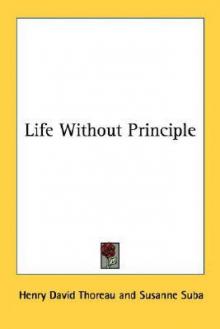 Life Without Principle
Life Without Principle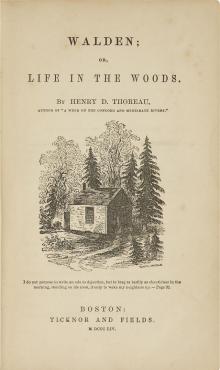 Walden
Walden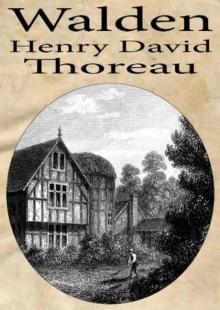 Walden by Henry David Thoreau
Walden by Henry David Thoreau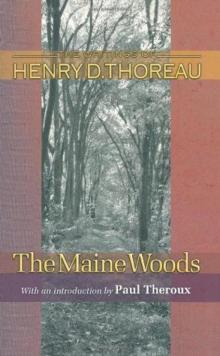 The Maine Woods (Writings of Henry D. Thoreau)
The Maine Woods (Writings of Henry D. Thoreau)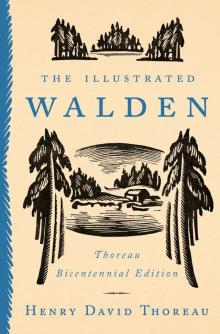 The Illustrated Walden
The Illustrated Walden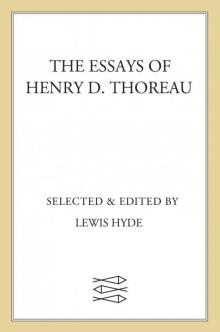 The Essays of Henry D. Thoreau
The Essays of Henry D. Thoreau